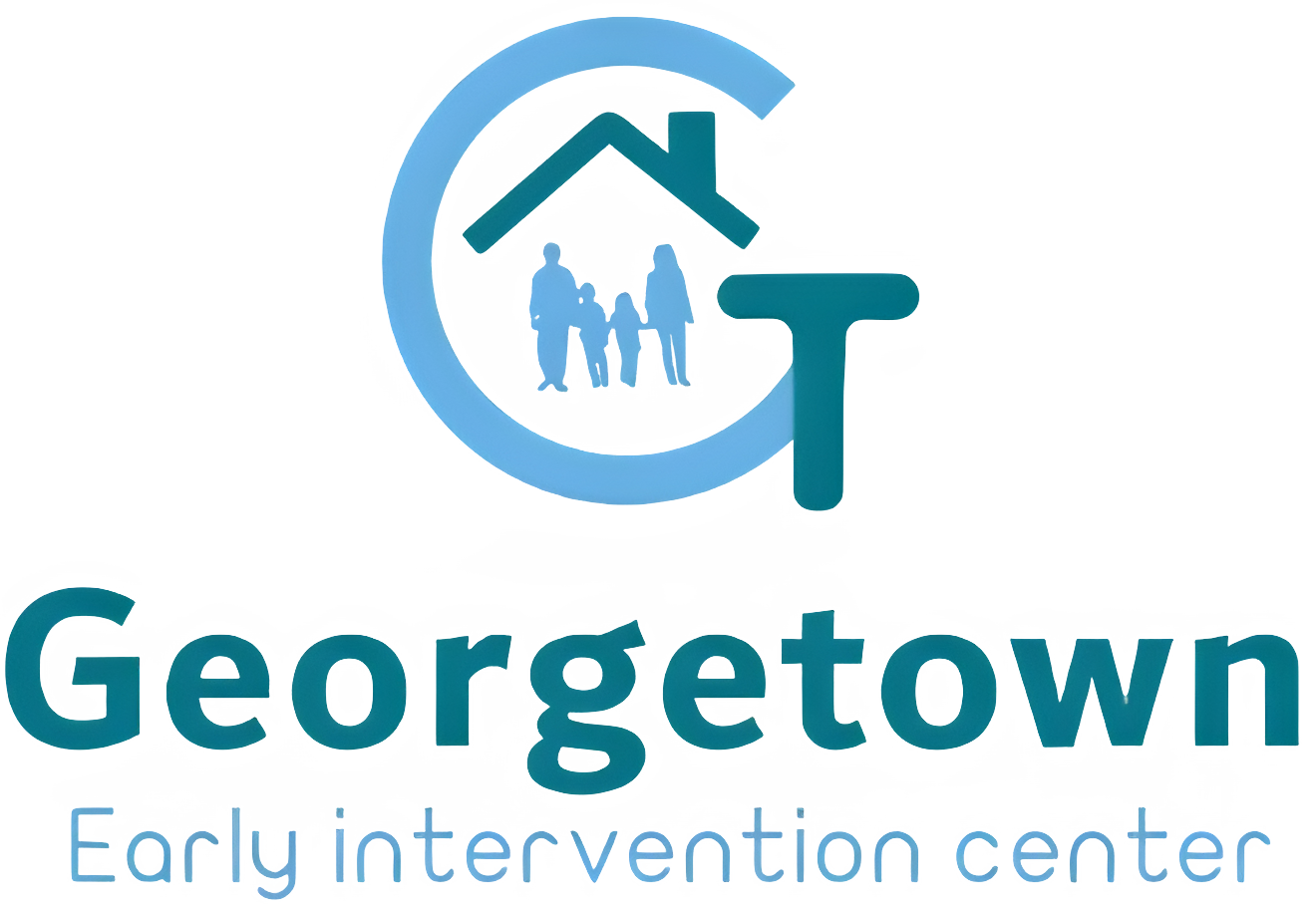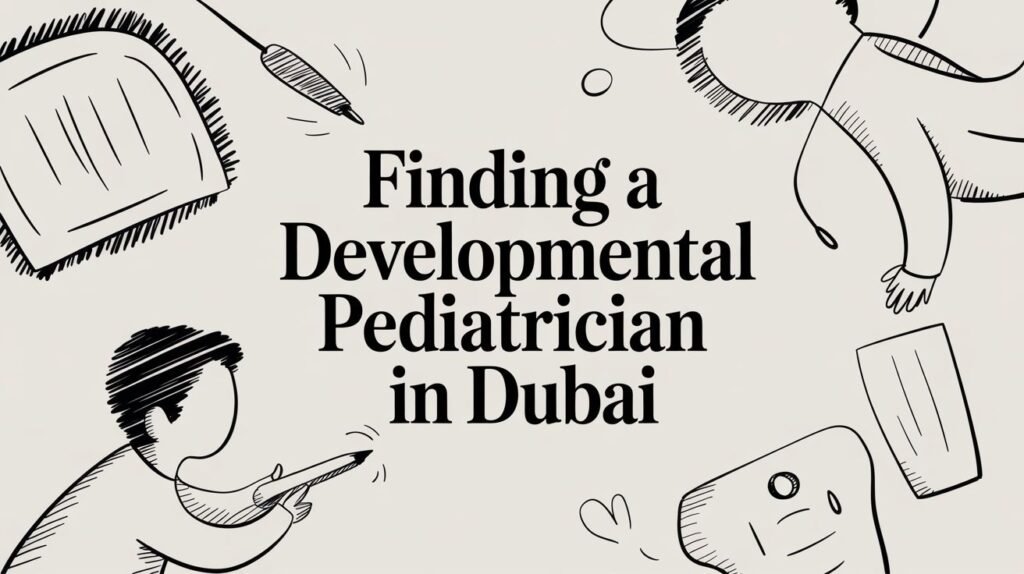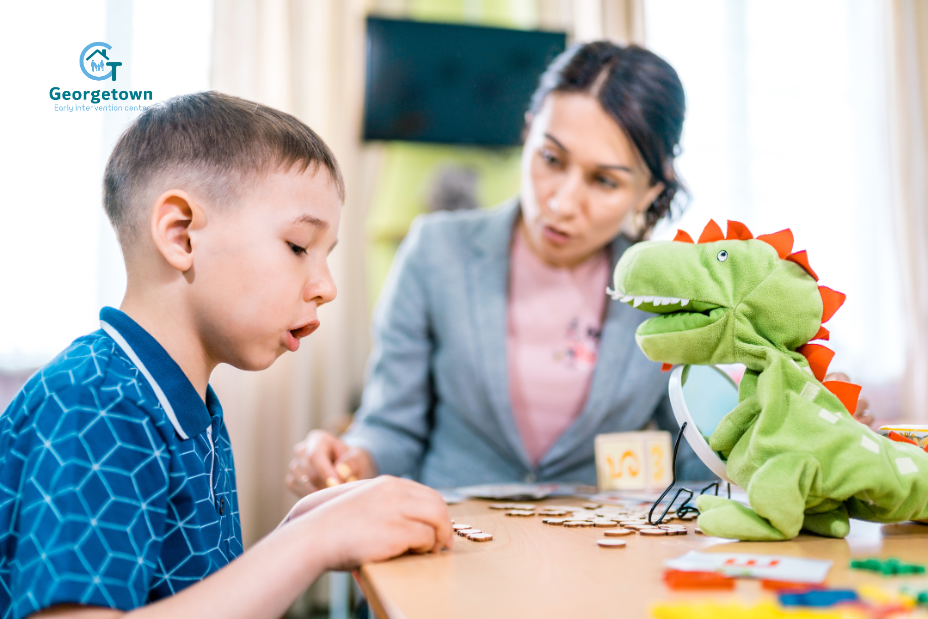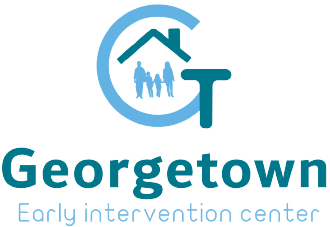That nagging feeling—the quiet question in the back of your mind about whether your child's development is on track—is something many parents experience. It can feel isolating, especially in a bustling city like Dubai where you're surrounded by options but not always sure where to turn.
Think of this guide as a friendly hand to hold, here to clear up the confusion around what a developmental paediatrician in Dubai does and how they can become a vital partner for your family.
Your Guide to Developmental Support in Dubai
Let's walk through this together. We'll start with those first flickers of concern and move step-by-step toward understanding what a specialist can offer and how to build a care plan that celebrates your child’s unique potential. Reaching out for expert advice isn't a sign of failure; it's a powerful, proactive step toward getting the answers you need.
Making that first call to a specialist is often the most significant move a parent can make. The importance of early intervention in child development is massive—getting the right support at the right time can fundamentally shape a child's future for the better.

A Growing Network of Care
Thankfully, Dubai's focus on early childhood healthcare has grown tremendously in recent years. This isn't just about building more clinics; it reflects a deeper community understanding and a real demand from families for specialised paediatric services. As the city expands, so does the support system for its youngest residents.
Dubai's commitment is clear: enrolment at private early childhood centres is projected to rise by 8% between mid-2024 and mid-2025, reaching over 29,600 children. This expansion, including 38 new centres, underscores the city's dedication to meeting the diverse needs of its youngest residents. You can learn more about Dubai's early childhood education growth from the KHDA.
This evolving landscape means finding the right help is more accessible than ever before. The trick is knowing what you’re looking for and how to get started.
This guide will give you the confidence to:
- Recognise the signs that a consultation might be helpful.
- Understand what a developmental paediatrician actually does.
- Walk into your first appointment prepared and ready to collaborate.
- Become the most effective champion for your child's needs.
Armed with the right information, parents in Dubai can connect with professionals who will help their child not just reach milestones, but truly flourish.
What a Developmental Paediatrician Really Does
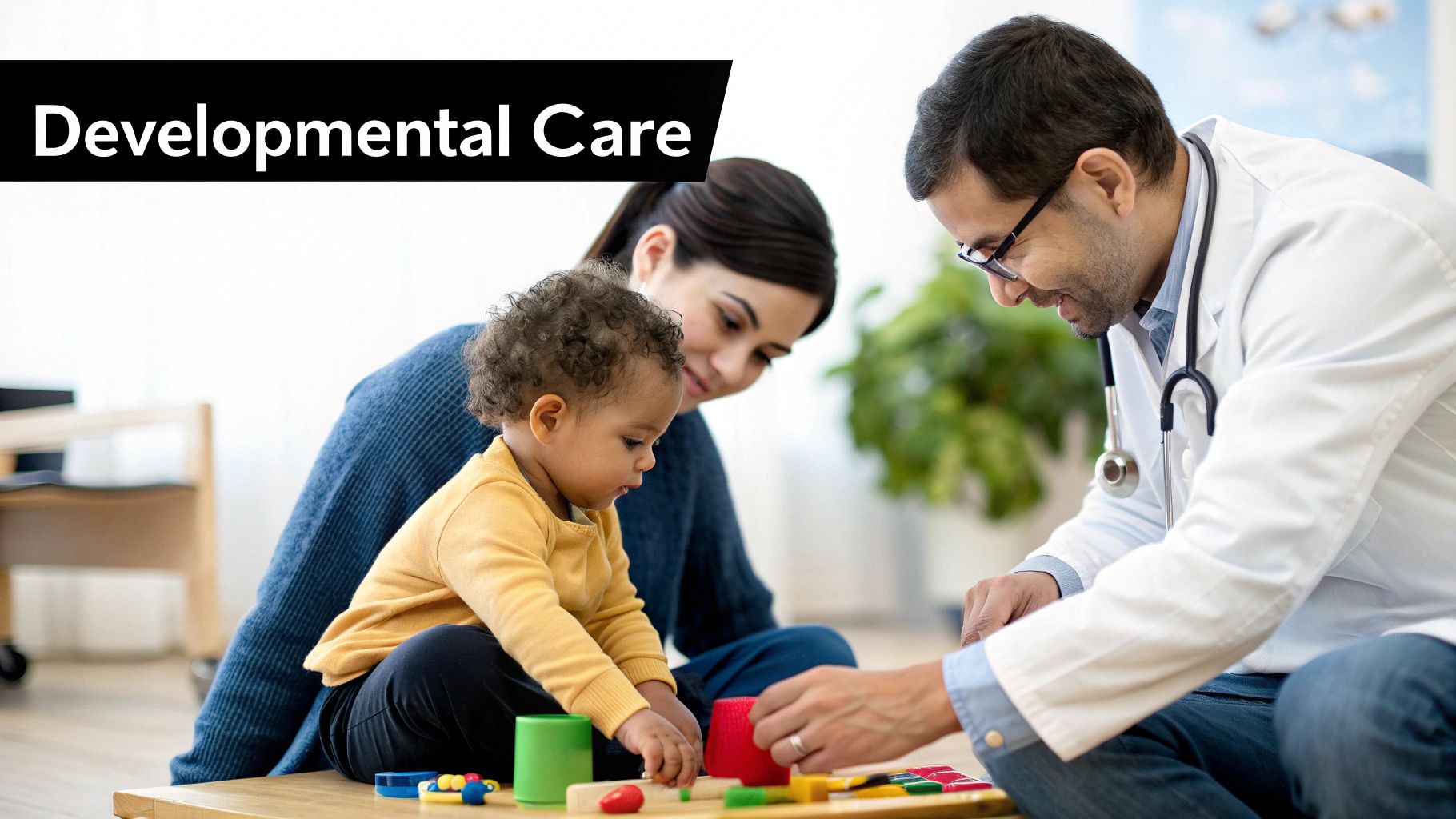
It’s easy to get lost in the sea of paediatric specialists. You have your general paediatrician, the one you see for fevers and check-ups. Think of them as your child’s primary care doctor, focused on their overall physical health.
A developmental paediatrician is different. They’re more like a master detective for your child's unique developmental journey.
These specialists are medical doctors who have spent years studying the intricate links between a child's brain, their behaviour, learning patterns, social skills, and physical abilities. Their primary job is to uncover the "why" behind any concerns you might have, whether it’s a delay in speech, challenges with making friends, or struggles at school.
The Role of a Developmental Detective
At its heart, their work is a deep and detailed investigation. This isn't your standard 15-minute check-up. They are piecing together clues from every corner of your child's life to see the full picture.
A developmental paediatrician in Dubai wears several important hats:
- In-Depth Assessment: They go beyond surface-level observations, using specialised tools, playtime interactions, and in-depth conversations with you to understand your child’s strengths and weaknesses.
- Accurate Diagnosis: They have the expertise to diagnose complex neurodevelopmental conditions like Autism Spectrum Disorder (ASD), Attention-Deficit/Hyperactivity Disorder (ADHD), and specific learning disabilities.
- Personalised Roadmaps: After the assessment, they don't just hand you a label. They create a customised plan outlining therapies, school supports, and home-based strategies to help your child move forward.
They also help untangle complex situations, guiding families through tricky diagnostic dilemmas in neurodevelopmental conditions like Autism and Sensory Processing Disorder-or-sensory-processing-disorder-(spd)-a-diagnostic-dilemma). This clarity is often the first, most crucial step toward getting the right kind of help.
The Central Coordinator of Your Child's Care Team
Perhaps one of their most vital roles is bringing everyone together. The world of child development can feel overwhelming, involving speech therapists, occupational therapists, teachers, and school counsellors. A developmental paediatrician makes sure they are all working from the same playbook.
They function as the "quarterback" of the care team, creating a unified strategy. This collaboration ensures that the interventions from therapists, educators, and parents are all aligned, preventing conflicting advice and creating a consistent support system for the child.
This coordinated approach is what truly drives progress. When a developmental paediatrician provides a clear diagnosis and a cohesive plan, it empowers therapists to deliver more targeted sessions and helps schools implement the right accommodations.
Ultimately, they bring order to what can feel like a confusing process, making sure every effort is focused on helping your child thrive. They become your family’s expert partner, navigating the path forward together.
That little voice in the back of your head, that parental intuition, is incredibly powerful. But sometimes, it helps to have a clearer roadmap to turn a general worry into a productive conversation with a specialist. The goal isn't to play doctor, but to collect specific observations that will paint a clear picture for a professional.
Many of us get stuck wondering, "Is this just a phase, or is it something more?" And that's completely normal. While every child blossoms at their own pace, some consistent patterns in their behaviour, communication, or learning might be gentle nudges suggesting it's time to get some clarity.
Think of these signs as conversation starters. A consultation with a developmental paediatrician in Dubai can either provide wonderful reassurance or set you and your child on a path toward the right support.
Communication and Social Interaction Challenges
One of the first things parents often notice is how their child connects—or doesn't connect—with the world around them. Of course, a toddler being shy is perfectly typical, but if you see persistent difficulties in social settings, it might be worth a closer look.
Ask yourself if your child:
- Consistently prefers playing alone and shows little interest in other kids.
- Finds it really difficult to make or hold eye contact when talking.
- Struggles to pick up on social cues, like facial expressions or hand gestures.
- Gets stuck in repetitive play patterns or has an unusually narrow set of interests.
These aren't red flags on their own, but they are the kind of detailed observations that are incredibly helpful to share during an appointment.
Learning and Attention Difficulties
Once children step into the world of preschool and primary school, the demands on their attention and organisational skills ramp up. This is often when underlying learning challenges become more obvious. It's one thing for a child to be a bit distractible; it's another when those struggles start to impact their confidence and progress at school.
A developmental paediatrician is an expert in diagnosing and managing a whole spectrum of developmental and behavioural conditions. To get a better sense of what conditions like ADHD can look like, you can explore these common ADHD symptoms and treatments. The specialist's job is to figure out if these difficulties are part of a bigger puzzle.
An assessment can reveal why a brilliantly creative child might not be able to follow three-step instructions or remember to put their homework in their bag. It connects the dots between how hard they're trying and what they're actually able to do, giving everyone a much clearer picture.
Behavioural and Emotional Regulation
Big, ongoing behavioural challenges are another key reason families seek an expert opinion. Let's be real—every child has tantrums. But when meltdowns are happening all the time, are incredibly intense, and seem completely out of proportion to the trigger, it could point to a deeper issue with managing emotions.
Other signs to keep an eye on include:
- Extreme rigidity or major distress when routines change.
- High levels of anxiety or persistent fears that get in the way of daily life.
- Impulsive behaviours that regularly put them or others in harm's way.
Making a quick note of when these behaviours happen and what seems to set them off can provide invaluable clues. It helps the specialist look past the behaviour itself to understand the why behind it, which is the first step toward finding compassionate, effective strategies that truly help your family.
A developmental paediatrician can help you understand what's typical for your child's age and what might signal a need for further evaluation. To give you a clearer idea, here is a quick guide to some common milestones and potential areas of concern.
Developmental Red Flags by Age Group
| Age Group | Key Milestones | Potential Concerns to Discuss |
|---|---|---|
| Infancy (0-12 months) | Babbling, responding to name, making eye contact, sitting without support, reaching for toys. | Lack of smiling, not responding to sounds, stiff or floppy limbs, not making eye contact. |
| Toddlerhood (1-3 years) | Walking, starting to talk in short phrases, pointing to objects, showing interest in other children. | Not walking by 18 months, limited vocabulary (fewer than 15 words by 18 months), not imitating actions. |
| Preschool (3-5 years) | Speaking in full sentences, asking "why" questions, dressing themselves, playing make-believe. | Unclear speech, trouble with social play, extreme difficulty separating from parents, unable to follow simple directions. |
| School-Age (6+ years) | Reading and writing, understanding rules, forming friendships, managing simple daily routines. | Significant difficulty with schoolwork, persistent social struggles, high levels of anxiety or aggression. |
This table isn't a diagnostic tool, but rather a guide to help you frame your observations. If you've noticed several of these signs over a period of time, it's a good reason to schedule a conversation. Trusting your gut and seeking professional guidance is always a positive step forward.
How to Choose the Right Developmental Pediatrician in Dubai
Finding the right specialist for your child is more than just a quick search. It’s about discovering a long-term partner who will join your family on this journey. Choosing a developmental pediatrician in Dubai is a significant decision, one that requires a thoughtful blend of professional expertise and genuine personal connection.
Kicking off this search can feel overwhelming, but the good news is you don’t have to go it alone. Your existing community is often the best place to start.
Starting Your Search
Begin by talking to the professionals and parents you already know and trust. A top-tier developmental pediatrician in Dubai will have a strong reputation, and positive word-of-mouth is one of the most reliable indicators of excellent care.
Here are a few great places to start gathering names:
- Your General Paediatrician: They’re on the front lines and usually have a go-to list of specialists they trust and refer their own patients to.
- Your Child’s School or Nursery: Educators and school counsellors often work closely with developmental paediatricians. They can recommend professionals whose methods align with their own educational approach.
- Parent Support Networks: Never underestimate the power of community. Online forums and local parent groups in Dubai are fantastic resources for honest, unfiltered feedback and personal stories.
Once you have a shortlist, it's time to dig a little deeper. This is where you shift from collecting names to really evaluating who might be the best fit for your child.
Evaluating Credentials and Expertise
A specialist’s qualifications are the bedrock of trust. You need to feel confident that they have the right training and background to support your child's unique needs.
Look for these key markers of expertise:
- Board Certifications: Are they board-certified in Developmental-Behavioural Pediatrics or a related field? This is your assurance that they've met incredibly high standards of training and knowledge.
- Specialised Experience: Does the paediatrician have a specific area of focus? Some have extensive experience with Autism Spectrum Disorder (ASD), while others might be experts in ADHD or learning disabilities. Try to find a specialist whose expertise lines up with your main concerns.
- Hospital Affiliations: Strong affiliations with reputable hospitals in Dubai often signal a well-respected and connected professional.
The demand for highly qualified specialists is high. In 2025, a paediatrician in Dubai earns an average annual salary of around 631,200 AED, with some of the top earners reaching 973,800 AED. This competitive landscape helps attract world-class talent, giving parents in the region access to some of the best professionals in the field.
Assessing Their Approach and Communication Style
Qualifications on paper are one thing, but you also need a partner whose philosophy of care clicks with your family. This is where the human side of medicine comes in. The most brilliant expert might not be the right choice if you can't communicate well with them. Sometimes, your child's needs might even cross into other specialties, so understanding the differences between a developmental paediatrician and a paediatric neurologist in Dubai can also help bring clarity.
The right specialist doesn't just talk at you; they talk with you. They should make you feel heard, respected, and empowered as a key member of your child's care team. A collaborative partnership is the goal.
During your first consultation, pay close attention to how they interact with both you and your child. Do they listen patiently? Do they explain complex ideas in a way that’s easy to grasp? Think of that first meeting as a two-way interview. You're choosing them just as much as they're assessing your child. Finding that perfect fit is the key to building a successful, trusting, and long-term relationship.
What to Expect During Your First Appointment

Walking into that first appointment with a developmental paediatrician in Dubai can feel a bit daunting. It's completely normal to feel nervous, but knowing what’s ahead can help turn that anxiety into a feeling of collaboration.
Think of this initial visit less as a test and more as a detailed information-gathering session. It's the starting point where you and the doctor begin to piece together the unique puzzle of your child's developmental profile.
The visit will almost always kick off with a detailed conversation. This is your chance to share your story—your observations, your worries, and everything that has led you to this point. The doctor will listen intently, asking thoughtful questions to understand your child's history, from pregnancy and birth right up to their current milestones.
Observation Through Playful Interaction
After you’ve had a chance to talk, the focus will naturally shift to your child. A skilled developmental paediatrician won’t just sit across a desk from them; they'll get down on the floor and engage them through play.
This isn’t just about making your little one feel comfortable. It’s a clever and effective way to observe their communication style, how they engage socially, their motor skills, and even their problem-solving abilities in a natural, low-pressure setting.
You might see the doctor pull out specific toys, suggest simple games, or ask your child to do a small task. This playful back-and-forth provides invaluable, real-time insights that a standardised test just can't capture. It’s a window into how your child thinks, moves, and connects with the world.
The first appointment is fundamentally about building a comprehensive picture. It's rare to walk out with a definitive diagnosis after just one session. The real goal is to identify areas that need a closer look, which will guide the next steps and any recommendations for further evaluations.
Understanding the full picture is a process, and this meeting is the crucial first step. If you’re curious about what those next steps might look like, you can learn more about the comprehensive assessment services in Dubai available to support families like yours.
How To Make Your Visit Productive
Coming prepared can make a huge difference in how much you get out of your time with the specialist. Gathering a few key documents beforehand gives the paediatrician the context they need for a more thorough and efficient consultation.
Try to bring these items along with you:
- School and Nursery Reports: What teachers have to say offers a valuable perspective on your child’s behaviour and learning in a completely different setting.
- Previous Assessments: If your child has seen other specialists (like a speech or occupational therapist), bring those reports. Every piece helps.
- A List of Your Concerns: In the moment, it’s easy to forget something important. Jot down your specific questions and observations beforehand.
- Short Video Clips: Sometimes, seeing is believing. A brief video from your phone showing a specific behaviour or challenge can be incredibly insightful for the doctor.
By preparing these materials, you help the developmental paediatrician connect the dots that much faster. It transforms your first appointment from a simple consultation into a highly productive and empowering step forward for your family.
Championing Your Child’s Unique Potential
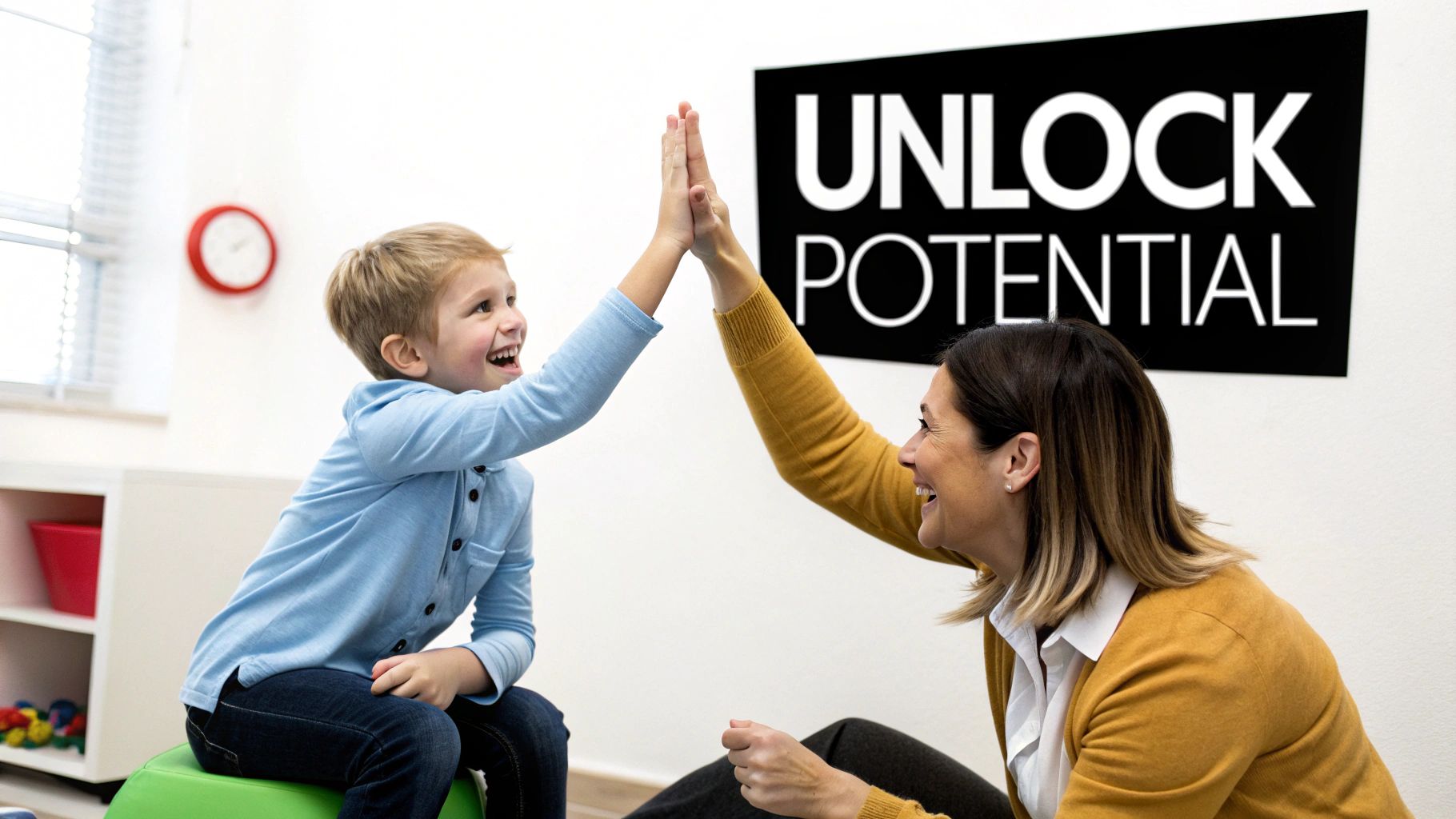
The journey to understanding your child's unique developmental path is a marathon, not a sprint. Choosing to see a developmental paediatrician in Dubai is a powerful, proactive step—it's about getting the right support that truly celebrates who your child is.
Think of this specialist as a key player on a bigger team. That team includes you, your child's therapists, and their educators, all working together. When everyone collaborates, it creates a world where your child feels seen, supported, and confident enough to grow.
Remember, the goal isn’t to change who your child is. It’s about giving them the specific tools and strategies they need to navigate the world successfully, on their own terms.
Hopefully, this guide has given you the confidence to find the right experts in Dubai and to step into your role as your child's strongest advocate. This partnership with the right professional is what will unlock the incredible potential that is uniquely theirs, making sure they have every chance to flourish.
Have Questions? Let's Find Some Answers.
Navigating developmental support for your child can feel overwhelming, and it's completely normal to have a lot of questions. Here are some straightforward answers to the queries we hear most often from parents considering a developmental paediatrician in Dubai.
Is a Consultation Covered by My Insurance?
This is usually one of the first and most practical questions parents ask. When it comes to insurance for developmental assessments in Dubai, the answer really depends on your specific provider and plan.
Most basic insurance policies might offer limited coverage, if any, for these specialised services. On the other hand, more comprehensive or enhanced plans often do include benefits for developmental paediatrics. You might find it listed under 'behavioural health services' or 'specialist consultations'.
A Quick Tip: Before you book anything, give your insurance provider a call. Ask them directly about coverage for a "developmental paediatric assessment" and check if you need pre-authorisation. It’s a simple step that can save you from unexpected bills down the line.
What’s the Difference Between All the Specialists?
It's easy to get confused by the different professional titles you come across. Two roles that often overlap in parents' minds are the developmental paediatrician and the child psychologist, but they play distinct, complementary roles in your child's care team.
A developmental paediatrician is a medical doctor (MD). Their expertise is in diagnosing and managing medical and neurodevelopmental conditions like ADHD or Autism Spectrum Disorder. They can prescribe medication and oversee any related medical issues, acting as the central medical guide for your child.
A child psychologist focuses more on the therapeutic and behavioural side of things. They are the ones who conduct detailed cognitive and educational tests, provide therapies (like ABA), and offer counselling to help children and families build coping strategies.
Think of them as two key players on the same team. They work together closely—the paediatrician provides the medical diagnosis and oversight, while the psychologist delivers the targeted therapy and support.
Will a Diagnosis Put a Label on My Child?
This is such a valid and deeply personal fear for any parent. The worry that a diagnosis might become a negative label that follows your child is completely understandable.
But in reality, a formal diagnosis is less of a label and more of a key. It doesn't define who your child is; instead, it unlocks a world of tailored support that was out of reach before. It gives teachers, therapists, and even family members a clear, shared language to understand and meet your child's unique needs.
Ultimately, a diagnosis is a roadmap. It’s the tool that helps you access individualised education plans (IEPs), specialised therapies, and essential school accommodations that truly empower your child to thrive on their own terms.
